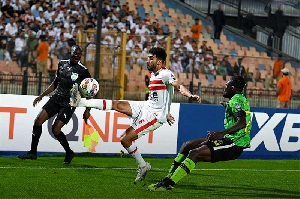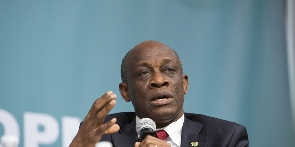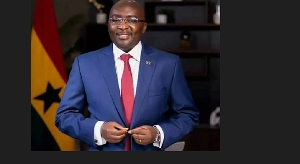- Home - News
- TWI News | TV
- Polls
- Year In Review
- News Archive
- Crime & Punishment
- Politics
- Regional
- Editorial
- Health
- Ghanaians Abroad
- Tabloid
- Africa
- Religion
- Election 2020
- Coronavirus
- News Videos | TV
- Photo Archives
- News Headlines
- Press Release
General News of Thursday, 16 May 2002
Source: --
Tsikata raises preliminary objection against AG
Tema (Greater Accra) - Mr Tsatsu Tsikata, former GNPC Chief Executive on Monday filed a suit at the Supreme Court to raise preliminary objective against the Attorney-General (AG) representing the Chief Justice (CJ) in a writ challenging the practice direction of the Chief Justice.
In an affidavit in support, Mr. Tsikata pointed out that the Chief Justice and the Attorney-General represent different arms of government and their roles as provided by the 1992 constitution do not allow for second defendant to represent the first defendant.
The facts stated in an affidavit in support of the case filed on 18 March, against the CJ refer to specific acts of first defendant, which he is independently required to answer. Mr Tsikata explained that in the circumstances of this case, there is a real likelihood that the independence of the judiciary, which the constitution seeks to establish, may be undermined by the first defendant being represented by the Attorney-General and a common statement of case filed.
"Since I filed the writ on 2/2002, I have become aware that it was the first defendant who inaugurated the "Fast Track Court" on 31 March 2001, at the time he was not Chief Justice, and the second defendant was invited by the first defendant to the inauguration as a special guest and gave an address on that occasion," he stated.
Mr Tsikata pointed out that the matters that he had placed before the Supreme Court in the writ 2/2002, were in respect of interpretation and enforcement of the constitution and "I did not advert to the personal roles of either of the defendants."
There is clear potential for conflict of interest in the second defendant, a Minister of State and, therefore, part of the Executive, representing the first defendant the head of the judiciary which is required to be independent of the Executive and of any other external influence. That is why, Mr. Tsikata believes, would run counter to the constitutional provisions governing their respective offices for them to seek common causes in this manner.
On 28 March, Mr Tsikata filed a writ challenging the practice direction of the Chief Justice and declaring, among others that, "on a true and correct interpretation of Article 133 (2) of the 1992 Constitutional requirement for there to be a panel of 11 justices of the Supreme Court to hear a review of a decision by a panel of nine justices of the Supreme Court.
He also declared that on a true and correct interpretation of Article 133 (2) of the 1992 Constitution, except in the case of a decision by a panel of five justices of the Supreme Court, there is no requirement of the Chief Justice to add two additional justices of the Supreme Court to hear an application for a review of a Supreme Court decision.
In Another development, when the Supreme Court listed the case Mr Tsatsu Tsikata versus the Chief Justice and Attorney-General to be heard on 14 May 2002, Prof E.V.O. Dankwa, Counsel for Plaintiff wrote to the Supreme Court, reminding it to adhere to the provision which requests at least 14 days of listing before hearing.
In a letter, Tsikata's counsel invoked the provisions of rule (23) of the Supreme Court Rule, 1996, CI 16, which requires that, "the Registrar shall, during each term, publish within the precinct of the court and of the High Court of Justice in each region, at least 14 days before hearing shortlists which shall show the criminal and civil appeals of matters which are to be heard by the court". Plaintiff's sources show that the list of the Supreme Court cases, which includes that of Tsikata, was published on 6 May 2002.










